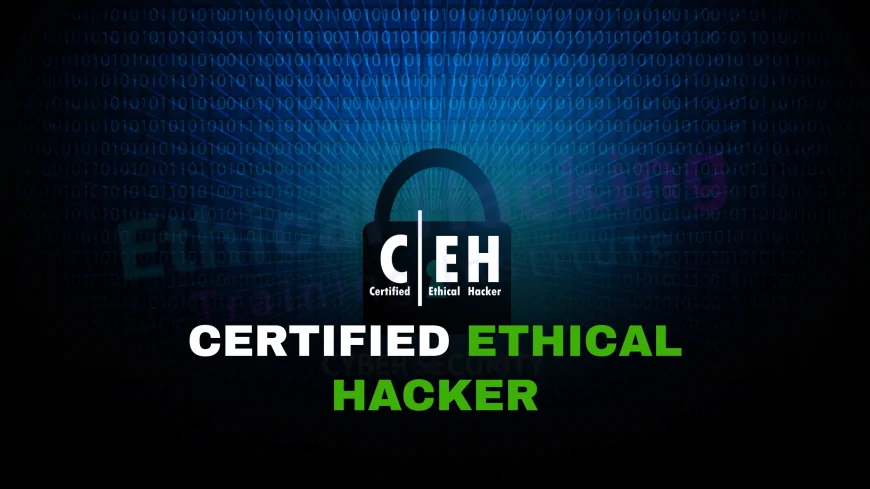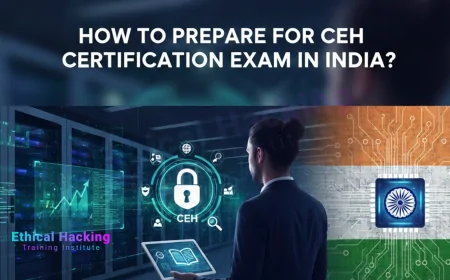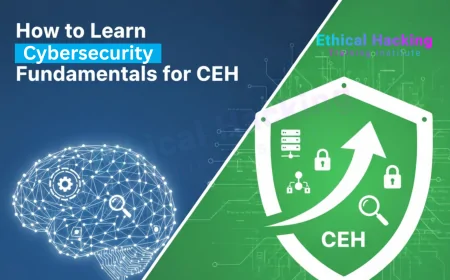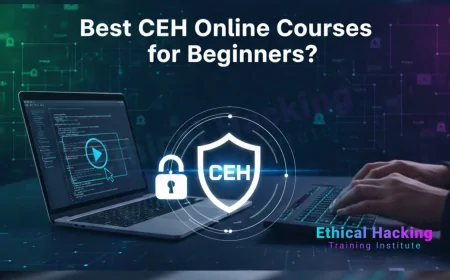Certified Hacker Certification: Everything You Need to Know | How to Get Certified as an Ethical Hacker: Key Info and Training Tips
Explore everything you need to know about Certified Hacker Certification—eligibility, exam details, training options, costs, benefits, and career outcomes in this complete guide.

Table of Contents
- Introduction
- What Is Certified Hacker?
- Key Benefits of Certification
- Eligibility & Pre-requisites
- Course Syllabus & Topics
- Training Paths & Options
- Exam Format & Scoring
- Cost & Investment
- Hands-On Learning & Labs
- Study & Preparation Tips
- Career Paths After Certification
- Industry Recognition & Demand
- Maintaining & Recertification
- Common Pitfalls to Avoid
- Top Resources & Communities
- Frequently Asked Questions
- Conclusion
Introduction
In an age where cyber threats are increasingly sophisticated, the Certified Hacker Certification stands as a cornerstone credential for cybersecurity professionals. It validates your knowledge of intrusion techniques while ensuring you can defend systems ethically. This comprehensive guide will explore every facet of this certification—from basic overview to advanced career paths.
What Is Certified Hacker?
The Certified Hacker Certification (CHC) is a globally recognized qualification designed to confirm an individual’s ability to perform penetration testing, vulnerability assessments, and ethical exploits. It trains candidates to adopt the mindset of a hacker to identify and secure weaknesses in networks, applications, and systems. CHC aligns with industry standards and ethical frameworks, certified by respected cybersecurity bodies.
Key Benefits of Certification
- Industry Credibility: This certification is trusted by enterprises and government organizations worldwide.
- Hands-On Skill Validation: Focused on real-world scenarios, including live labs and attack simulations.
- Career Opportunities: Opens doors to roles like penetration tester, security analyst, and ethical hacker.
- Compliance Advantage: Helps employers meet standards such as ISO, HIPAA, and GDPR.
- Higher Earning Potential: Certified professionals earn 20–30% more than their non‑certified counterparts.
Eligibility & Pre-requisites
You typically need one of the following to enroll:
- Completion of an accredited training program
- At least 2 years of professional experience in cybersecurity or IT
- Submission of prior work experience proof and endorsement of a code of ethics
Successful applicants gain exam access without further requirements.
Course Syllabus & Topics
CHC covers a wide range of domains, typically including:
- Security fundamentals & hacker mindset
- Footprinting & network reconnaissance
- System & web application penetration
- Wireless and mobile hacking techniques
- Cryptanalysis and vulnerability exploitation
- Incident handling and post-exploitation
- Ethics, compliance, and report writing
Training Paths & Options
- Official Training Courses: Instructor-led classes with live labs.
- Online Self-Paced Programs: Video lectures, quizzes, and digital lab environments.
- Hybrid/Bootcamp Models: Weekend labs + online theory.
- Self-Study: Using off‑the‑shelf study guides and free lab platforms.
Exam Format & Scoring
Typical CHC exam structure includes:
- 120 multiple-choice questions
- 4-hour time limit
- Passing score ranges from 65–80%
- Delivered through proctored online or in-person testing
Cost & Investment
Investing in CHC includes:
- Exam voucher: $800–1,200
- Training program: $2,000–3,500 for bootcamp; $500–1,200 for online courses
- Recommended tools & labs: $100–300
Some providers bundle training, exam, and lab access in one package—saving you money and ensuring alignment.
Hands-On Learning & Labs
The hands-on component sets CHC apart. Labs typically include:
- Vulnerable machines (OS, web, wireless)
- Web applications with exploitable flaws (e.g., SQLi, XSS)
- Real-world incident scenarios and forensic analysis
Practice platforms compatible with CHC include Hack The Box, TryHackMe, and official accredited labs.
Study & Preparation Tips
- Create a schedule mixing theory and lab work
- Take practice tests weekly
- Participate in peer-study or mentor groups
- Log every lab you complete and reflect on lessons learned
- Follow cybersecurity news and recent exploits
Career Paths After Certification
- Penetration Tester / Ethical Hacker
- Security Consultant
- Incident Responder
- Red Team Specialist
- Security Auditor
Industry Recognition & Demand
Organizations across finance, healthcare, government, and IT sectors seek CHC-certified professionals. The certification aligns with compliance and security best practices, making holders highly marketable.
Maintaining & Recertification
CHC certification typically lasts 3 years. During this period, certified professionals must earn Continuing Education Units (CEUs)—ranging from 60–120 units through training, conferences, research, or teaching. An annual maintenance fee may also apply. This ensures ongoing relevance and boosts credibility in the fast-paced cybersecurity field.
Common Pitfalls to Avoid
- Relying solely on theory without labs
- Not tracking study progress or scheduling practice
- Skipping mock exams under time constraints
- Ignoring ethics and compliance in real-world contexts
- Not budgeting for recertification requirements
Top Resources & Communities
- Official CHC study guide and exam prep kits
- Online lab platforms: HTB, TryHackMe, VMWare vulnerable lab images
- Security blogs: Krebs on Security, ThreatPost, HackerOne
- Forums: Reddit’s /r/netsec, Discord InfoSec channels
- Conferences: BSides, DEF CON, local InfoSec meetups
Frequently Asked Questions (FAQs)
It is a globally recognized cybersecurity credential that verifies your ethical hacking and penetration testing skills under legal and professional standards.
Certified Hacker is a general term, while CEH (Certified Ethical Hacker) is a specific certification offered by EC-Council, which is widely respected in the industry.
Anyone interested in cybersecurity roles such as ethical hacker, penetration tester, SOC analyst, or network security engineer can benefit from this certification.
Basic programming knowledge (e.g., Python, Bash, PowerShell) is helpful, but not mandatory for entry-level certifications. Advanced roles may require deeper skills.
Typically, either completion of an accredited training course or at least 2 years of work experience in cybersecurity or networking.
Costs vary from $500 to $3,000 depending on whether you self-study, join a bootcamp, or take official training. Exam vouchers usually cost $800–$1,200.
Topics include network scanning, vulnerability assessment, web application attacks, social engineering, cryptography, wireless security, and ethical hacking methodology.
It is moderately difficult, especially if you don’t practice hands-on labs. A mix of theoretical knowledge and real-world testing scenarios is required.
Usually multiple-choice with 120 questions in 4 hours. Some advanced certifications include a practical, hands-on exam component as well.
No. Most certifications are valid for 3 years. You must renew them by earning Continuing Education Credits (CEUs) or retaking the exam.
Certified professionals earn between $60,000 and $120,000 annually, depending on location, role, and experience level.
Yes. You can find free ethical hacking tutorials on platforms like TryHackMe, Hack The Box, OWASP, and even YouTube.
While certification boosts your chances, employers also value hands-on experience, internships, and a strong portfolio or lab record.
Instructor-led courses, online bootcamps, or platforms like WebAsha, Offensive Security, or EC-Council ATCs are highly recommended.
Preparation time varies from 1 to 6 months depending on your background and whether you’re studying full-time or part-time.
Yes, provided they are from recognized bodies and include hands-on labs. Accreditation and lab quality matter more than format.
You can work as an ethical hacker, security analyst, vulnerability assessor, red team member, or penetration tester.
Yes. Certifications like CEH, OSCP, and others are globally recognized, especially when backed by experience and real-world skills.
Yes, but some providers charge an additional fee. You may also have to wait a specific period before reattempting.
Maintain certification by earning CEUs, attending webinars, publishing research, completing new courses, or contributing to security communities.
The Certified Hacker Certification is a powerful credential that blends theoretical knowledge with real-world skills, ideal for aspiring cybersecurity professionals. By following structured training, practicing rigorously in lab environments, and staying engaged in the security community, you can achieve certification and launch a fruitful career. Use this guide to navigate the process, avoid common mistakes, and maximize your professional impact.
1. What is the Certified Hacker Certification?
2. Is Certified Hacker the same as CEH?
3. Who should pursue this certification?
4. Do I need coding skills to become certified?
5. What are the prerequisites for Certified Hacker exams?
6. How much does it cost to get certified?
7. What topics are covered in the exam?
8. How difficult is the exam?
9. What is the format of the exam?
10. Is the certification valid forever?
11. What is the average salary after certification?
12. Are there free study materials available?
13. Can I get a job with just the certification?
14. Which training is best for certification?
15. How long does it take to prepare?
16. Are online certifications respected?
17. What jobs can I get with this certification?
18. Do employers recognize this certification globally?
19. Can I retake the exam if I fail?
20. How can I stay certified and up-to-date?
Conclusion
What's Your Reaction?
 Like
0
Like
0
 Dislike
0
Dislike
0
 Love
0
Love
0
 Funny
0
Funny
0
 Angry
0
Angry
0
 Sad
0
Sad
0
 Wow
0
Wow
0


















